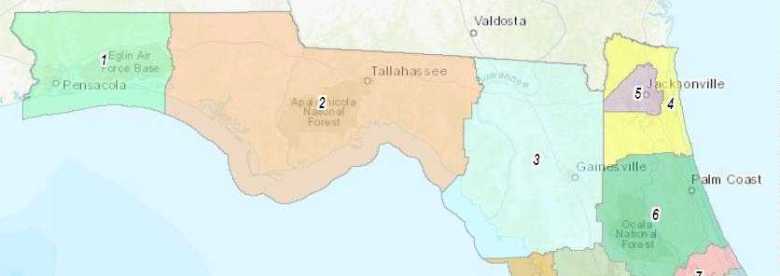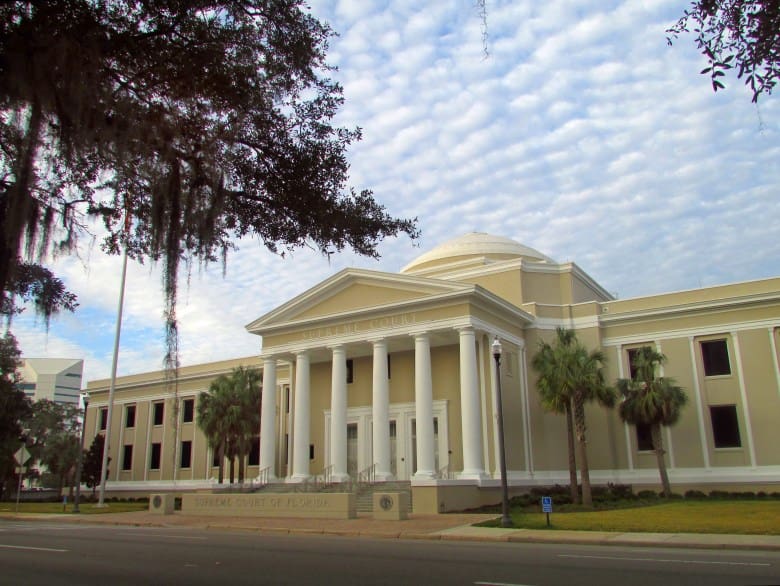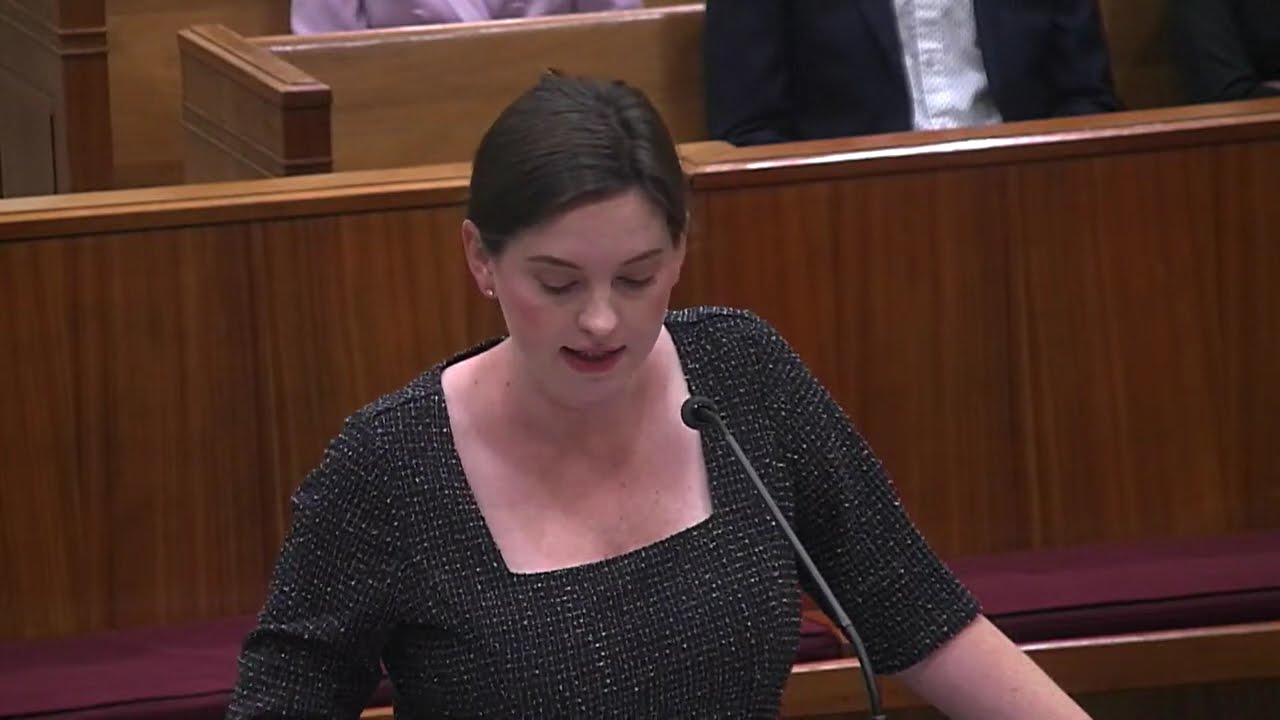TALLAHASSEE | The Florida Supreme Court’s conservative majority revealed the high stakes for minority voting rights Thursday as justices questioned whether protections under the state’s Fair Districts Amendments will survive Gov. Ron DeSantis’ aggressive efforts to dismantle them.
Thursday’s oral arguments pitted plaintiffs against state officials in a challenge over DeSantis’ 2022 congressional map that eliminated a district where Black voters had consistently elected their preferred candidates for three decades. DeSantis’ map dismantled the former 5th Congressional District, which stretched about 200 miles across North Florida from Jacksonville to Tallahassee and was formerly held by Democratic U.S. Rep. Al Lawson.
In its stead, DeSantis spread those Black voters across four separate districts, all of which elected white Republicans in 2022.
While the state and plaintiffs, including Black Voters Matter and the Equal Ground Education Fund, have agreed the move diminished Black voting power in apparent violation of the state’s Fair Districts Amendments, DeSantis’ lawyers have argued the state’s protections for racial minorities violate the U.S. Constitution.

Throughout the arguments, Chief Justice Carlos Muñiz and Justices Meredith Sasso and John Couriel — all DeSantis appointees — led an intense line of questioning that signaled the potential impact if the court rules against the plaintiffs.
Muñiz said a ruling against the plaintiffs would likely “neuter” part of the Fair Districts Amendments codified by 63% of Florida voters in 2010, a decision that could signal the end of minority voting protections in the state.
The court’s decision will not affect the 2024 elections.
Muñiz also suggested that if the court strikes down the protections for racial minority groups, it may need to declare the entire Fair Districts Amendments invalid, including anti-partisan gerrymandering protections.
Michael Li, senior counsel for the Brennan Center’s Democracy Program, said challenges to the Fair Districts Amendments indicate the need for a multi-layered approach to gerrymandering.

“If you want to fix this problem, you need a ‘belt and suspenders’ approach,” Li said. “It’s not enough to rely on reforms in states because they may be challenged. You also need Congress to renew and strengthen [voting rights] and ban partisan gerrymandering.”
Even if the plaintiffs succeed, Li and other advocates worry DeSantis could appeal to the U.S. Supreme Court.
“Many people have felt this is a strategy to get this issue before the U.S. Supreme Court in ways that could do a lot of damage around the country,” Li said. “Even though this is the Florida Supreme Court, I don’t think anyone should treat this as the end of the story.”
The three justices’ inquiries focused on the tension between Florida’s constitutional non-diminishment clause—intended to protect minority voting rights—and the Equal Protection Clause of the U.S. Constitution.
Justice Charles Canady, who was part of a conservative minority when the court ruled for voting rights plaintiffs in a redistricting case last decade, recused from the case. Although he didn’t give a reason why, his wife is a state legislator.
The justices who spoke seemed to reject the arguments used by the First District Court of Appeal that the state’s non-diminishment clause must meet a separate test used for vote dilution cases. The lower court also ruled that the Florida Supreme Court’s opinions last decade were not binding.
Muñiz pressed Christina Ford, the attorney representing Black Voters Matter, on whether the Fair Districts Amendments inherently require race to be a predominant factor in redistricting.
“It seems like FDA kind of had this maybe unintended effect of constricting the allowable traditional redistricting criteria on the one hand, and on the other hand, requiring that race be prioritized,” Muñiz said. “It seems like we’re just sort of setting up, sort of, a head-on conflict, or at least the possibility of a conflict, with the Equal Protection clause just on its face.”
Muñiz questioned whether the Fair Districts Amendments, by making minority protections a top priority, leave lawmakers with little flexibility to balance other redistricting criteria like drawing compact districts.
This, he said, could “stack the deck” by making racial considerations the primary focus, potentially putting the Legislature “in the zone where you’re having to worry about strict scrutiny and deliberate racial sorting.”
Solicitor General Henry Whittaker, representing DeSantis’ secretary of state, agreed with that.
“The textbook example [of racial gerrymandering] is where the state sacrifices traditional redistricting principles to meet a rigid racial target,” he said. “And that’s exactly what the non-diminishment standard would require.”
Ford argued the legislature has demonstrated its ability to “harmonize” the various standards for redistricting, pointing to the two versions of a protected North Florida district that DeSantis vetoed as “proof positive” that the non-diminishment criteria does not inherently contradict the Equal Protection Clause.
She also pointed out the Legislature and DeSantis weren’t asking the court to throw out other legislative and congressional districts that the state has said were drawn to protect minority voting power.
The Legislature’s lawyers, led by Dan Nordby, argued those districts, unlike the contested North Florida district, could be drawn to protect Black voting power without prioritizing race over other factors.
He pointed out the plaintiffs had “every incentive in the world” to present a North Florida district that could achieve this delicate balance. “If it were possible to draw a circle, a square, or maybe even a long rectangle that wasn’t race predominant, that didn’t diminish [Black voting power], surely they would have done so,” he argued.
Ford, however, pointed to the Republican legislative leadership’s own statements praising two versions of the North Florida districts: one that stretched from Jacksonville to Tallahassee and another contained wholly inside Duval County.
“It is in the record that the state can comply with these two things, both non-diminishment and the Equal Protection clause,” she said.
Nordby acknowledged that the Legislature never claimed race predominated in the Duval-only district that DeSantis vetoed. However, he argued the district still would have reduced Black voting power.
The plaintiffs’ arguments have mainly focused on asking the court to uphold the precedents set a decade ago. In a press conference following the hearing, plaintiffs and their allies shared their thoughts on the case and its potential outcome.
“This is a textbook application of the law which is enshrined currently in Florida’s Constitution,” said Olivia Mendoza, litigation director of the National Redistricting Foundation, “and it requires the state to restore the 5th Congressional District where Black voters can elect their candidates of choice.”
The Rev. R.L. Gundy, a plaintiff from Jacksonville who lives in what used to be the protected district, cut through the legal niceties with a stark assessment: “When DeSantis chose to take that district away, he became a dictator rather than a governor of the people, for the people, and by the people.”
Despite the court’s conservative lean, Genesis Robinson, the interim executive director of Equal Ground Education Fund, another plaintiff, remained hopeful following the arguments.
“We can do nothing but be optimistic that the court will rule and follow precedent,” Robinson said, “and give us a fair shake.”
Bea Lunardini is an investigative fellow with The Tributary. She can be reached at bea.lunardini@jaxtrib.org.





